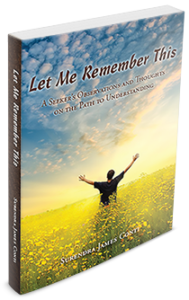Have you ever had a nemesis? Someone you couldn’t get rid of, who could make you crazy with wanting to do him in? Someone like Moriarty to Sherlock Holmes?
I’m happy to say that I’ve never had anyone as nasty as that in my life. Many are they who I’ve walk the other way to avoid, but none has tortured my thoughts.
Years ago, however, at the heel end of a self-inflicted misery, I realized that I have had a nemesis – the very same one – over the course of countless incarnations. He isn’t a physical person I can punch or take apart; he’s a resident of my own brain, a character in my script that I cannot delete: the eminent Ego.
I give the Ego a capital E out of sheer respect for its persuasive influence and unflagging persistence. The Ego certainly catches the blame for most of the trouble I manage to get myself into. But here’s the catch: I don’t really despise it. In fact, I give it a lot of my attention, especially when its counsel is what my urges are wanting to hear.
The Ego’s attendant presence in my life raises an age-old series of questions: Is it merely a mischief-maker that God has imposed on me for His amusement, or does it possess redeeming qualities that I could be wisely using? Am I simply stuck with it, with its tendency to leave me wishing I had ignored it when I didn’t, or is there a way I can free it and send it packing?
As it turns out, the Ego is an ancient player, whose origin dates to India’s epic saga, the Mahabharata. Long before it was known to Freud and others by his three-letter name, the Ego was renowned in regal courts as a nobleman of the highest principles and moral conduct. His name was Bhishma, and his pedigree was unsurpassed. Bhishma was the son of the great King Shantanu and the goddess Ganga, symbolic of the primordial intelligence in Nature. By his magnanimous disposition, he grew to be a virtuous and selfless prince, devoted to serving the good of his fellow countrymen.
Bhishma, in the beginning, appears in stark contrast to the Ego as seen on display in the world today, for this is who he was meant to be, a gallant renunciate in the face of worldly temptations. He was such a loyalist, in fact, that in deference to a request that he give up his rightful claim to his father’s throne, he willingly complied. For this gracious act of sacrifice, Bhishma was granted an extraordinary boon: he could not be killed, nor would he die, except of his own choosing.
Here the story begins to turn. As years passed, the kingdom was beset with divisive forces, and a monumental battle loomed: the battle of Kurukshetra, which actually took place several hundred years before the birth of Christ. More importantly, it was an allegorical fight for the individual soul against the forces of delusion. Bhishma’s one great flaw is that he chose to stand on the side of material desire, in support of delusion.
And so it is that, despite the Ego’s commitment to the ways of the senses and to the lure of earthly desires, we cannot dispatch it from within us. We can only, by our resistance to its advice, coax it to release us from its grip.
Yet, the question remains: How did this virtuous friend become such a difficult foe?
Does the Ego want us to fail, to suffer, to regret the mistakes we make? Of course not.
It just wants us to trust it, which tends to be risky business, because its focus is ephemeral and short-sighted, commonly resulting in trouble. I suspect the Ego would love for us to be happy, but alas, the pleasures it promotes are fleeting, and the aftermath of these involves a toll. The Ego has developed its own agenda, reflected in the consumer mentality of our society itself.
As an advocate for material desire, the Ego’s perspective is of the ways and whims of the outside world, and thus it is ruled by duality, by the world’s pendulum swings between pleasure and pain. It tries to be a friend by constantly looking for the next high to offset the lows that it causes us to incur, but it cannot make our good times last. The Ego appeals to our emotions, and when that appeal triggers an emotional reaction, there is a problem ahead.
We know from our spiritual teachings, and lately from science too, that all things are interconnected. The Ego cannot be viewed in isolation. It is tied to the whole of karma and reincarnation, and like an indestructible machine, it seems to exist mainly to produce an endless stream of earthly likes and dislikes for us to adopt. Let’s give credit where credit is due: the Ego is a tireless and tremendously effective force. It may not always get its way, but its average is highly impressive.
Also to its credit is the role the Ego plays in our formative years. It motivates us to acquire skills and self-confidence, to improve our minds, and even to begin a search for deeper meaning and fulfillment in our lives. The world out there can be cruel at times, and the Ego, if cultivated wisely, can be a useful ally in meeting some of life’s more difficult challenges.
But once it falls into delusion, the Ego becomes the opponent of our soul’s journey back to freedom in God. Our task at that point, over a span of many incarnations, is to muster the courage, strength, and faith to keep it from becoming a disruptive force. It can still be an ally and friend, but only if we redirect its energy from an outward, sensory momentum to an inward and upward focus.
The key to foiling the Ego’s impulsive nature is to realize its impotence to fulfill us, and thereby to avoid reacting to the pull of its appeals. This requires a practice not of suppression, but rather of learning to release. Jesus in the Bible and Krishna in the Bhagavad Gita made it clear that nothing we give away is lost. For every egoic desire, attachment, and habit we surrender, the value of our karmic investment portfolio increases. Losing becomes winning.
Human than I am, I still pursue my favorite worldly pleasures with considerable relish. But now with a calmer consciousness than before, accepting that nothing about them will endure, and expecting only that whatever occurs will ultimately be for the best, whether or not it would have been my choice.
The Ego counts on its counsel turning out as it foresees. In the short term it is often right, in the long term mostly wrong. Since we don’t always get what we want, it’s important to foster an attitude of wanting what we get. Though plainly not easy to accomplish, we find that when we can calmly accept whatever comes our way, we are able to greatly mitigate the disappointment of an untoward result. For me this is admittedly an aspiration more than a regular feat, but it spares me a lot of unnecessary woe.
Here’s another anti-egoic strategy that helps: catching myself when I start to think of anything as “mine.” In yoga the practice of nishkam karma – non-attachment to the fruit of one’s labor – is wondrously effective in eliminating stress and suffering. This, too, demands vigilant self-control, for we incline to take pride in what we are able to achieve, acquire, and possess. It’s an “I” thing regarded as natural and normal, but it puts the Ego in the driver’s seat, assuring a bumpy ride of misdirection.
Finally, another risky habit needs to be revised: our tendency to rationalize our desires.
I would bet that we all do this to some degree, because we want to convince ourselves that we deserve the objects of our affections. If you think there’s a “good reason” why something or someone should be yours to name as your own, that rationale is coming straight from Ego, and you can rely on its coming back to bite you.
In truth, nothing is ours. Not so much as a toothbrush goes with us when we transition to our next destination.
A large part of our job in this life is to unlearn a lot of our training. That includes not getting suckered into egoic swamps and snares. The Ego has a nemesis too. It is our self-control. When we improve and apply it, the Ego submits to its leash. Lifetimes more may be necessary to loosen and undo its grip, but even the Ego itself, born of nobility that unwittingly went astray, secretly roots for that final effect: the day when it, as Bhishma, surrenders to the greater good of the soul.

